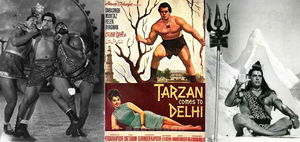New Delhi, Nov 19 (IANS) The ethos underpinning his exploits in the wrestling arena and film roles can be understood by his cameo in ‘Anand’ (1971). Hassled by a gang of roadside ruffians, the film’s eponymous hero approaches the neighbourhood ‘pehalwan’, and “Papaji”, learning that women are being harassed, dons his kurta, rolls up his sleeves, flexes his muscles, and sends them packing in terror.
Tossing villains around like toys, stopping aeroplanes with his bare hands, and chasing criminals to the moon — in reel life, Dara Singh was not only the epitome of sheer strength for generations of Indians but also an icon of its righteous and chivalric nature, not just aggressive machismo.
In his real life, he remained an unbeaten wrestler in both the amateur and professional formats — once even making the Prime Minister stay for nearly an hour to watch him down his opponent.
When Ramanand Sagar, tasked with adapting ‘Ramayan’ for TV, was casting, several aspirants angled for the role of Hanuman, but he, without hesitation, plumped for Dara Singh — though he was then above 50.
But, it was not the first time Dara Singh, who was born on this day (November 19) in 1928, had played the role of Hanuman. He played the wind god’s son for the first time two decades back in ‘Veer Bajrang’ (1965), in ‘Bajrangbali’ (1976), then in B. R. Chopra’s TV series ‘Mahabharat’, and finally in TV serial ‘Lav Kush’ (1997).
He also played Hanuman’s earthly father Kesari in the TV serial ‘Jai Veer Hanuman’ (1995), opposite his son Vindu Dara Singh, and then, Bhima’s son Ghatotkach in the Gujarati film ‘Maya Bazaar’ (1984) — two decades after playing Bheem in Babubhai Mistry’s ‘Mahabharat’ (1965) — with grappling partner Tiger Joginder Singh as Hanuman!
Dara Singh also played Lord Krishna’s fiery elder brother Balram twice in ‘Balram Shri Krishna’ (1968) and ‘Krishna-Krishna’ (1986), Lord Shiva thrice — in ‘Tulsi Vivah’ (1971), ‘Hari Darshan’ (1972), ‘Har Har Mahadev’ (1974), and devotee, Dyanu Bhakt, who had cut off his own head to sacrifice to the mother goddess and was resurrected, in ‘Bhakti Mein Shakti’ (1978), and ‘Dhyanu Bhagat’ (Punjabi, 1978).
Born in a Jat Sikh family in Dharmuchak village of Amritsar in 1928, Deedara ‘Dara’ Singh Randhawa was not a born strongman, being bullied, until — like Hanuman — he was made aware of his strength.
Married young but having a troubled time as his wife and mother quarrelled often, he decided to go to Singapore in 1947, where his uncle worked and got a job in a drum manufacturing mill. Though he had wrestled in his childhood, he began formal training and soon began winning competitions in Singapore, as well as in India, Sri Lanka, Russia, and the US.
Back in India, he won the ‘Rustam-e-Hind’ tournament in 1954, defeating Tiger Joginder Singh, and in 1959, the Commonwealth Championship by defeating George Gordienko. Ahead of this, he had met Prime Minister Jawaharlal Nehru and pleaded with him to come to the matches in Delhi to encourage the Indian wrestlers. Pandit Nehru consented to come for ten minutes but was so engrossed in seeing Dara Singh fight, that he stayed almost an hour, ignoring his aides.
He went on to win the World Championship in 1968.
Mindful of the travails of elderly wrestlers like Gama Pehalwan, in old age, Dara Singh saw films as a means to ensure a comfortable retirement. While, he debuted with a cameo in Dilip Kumar-Madhubala’s ‘Sangdil’, and then as a wrestler in Kishore Kumar and Vyjanthimala-starrer ‘Pehli Jhalak’ (1954), it was only in the 1960s that he made his mark — in a string of B-grade films, spanning costumed dramas to science fiction.
He was mostly paired with Mumtaz, whose sultry charms were a foil to his rugged masculinity. Most of these are obscure — ‘Faulad’ (1963), ‘Rustom-E-Baghdad’ (1963), ‘Chand Par Chadayee’ (1967), and so on, but were popular and made enough money that he got Rs 4 lakh per film.
He also played the Biblical strongman in ‘Samson’ (1964), early 20th-century outlaw, Jagat Singh Virk aka Jagga Jat in ‘Jagga’ (Punjabi, 1964), the jungle hero in ‘Tarzan Comes to Delhi’ (1965), Emperor Akbar-era outlaw Abdullah ‘Dullah’ Bhati, of the Lohri song fame, in ‘Dulla Bhatti’ (Punjabi, 1966), and the title role in ‘Sultana Daku’ (1972).
He also played Alexander the Great in ‘Sikandar-e-Azam’ (1965) — opposite Prithviraj Kapoor, who had played the role himself over two decades back but was now Raja Porus, and a circus strongman in Raj Kapoor’s ‘Mera Naam Joker’ (1970).
Retiring from wrestling in 1983, he continued to appear in films and TV serials till he succumbed to a heart attack in 2012, with highlights being Shah Rukh Khan’s young-at-heart uncle in ‘Kal Ho Na Ho’ (2003) and Kareena Kapoor’s grandfather in ‘Jab We Met’ (2007).
(Vikas Datta can be contacted at vikas.d@ians.in)
–IANS
vd/kvd



























